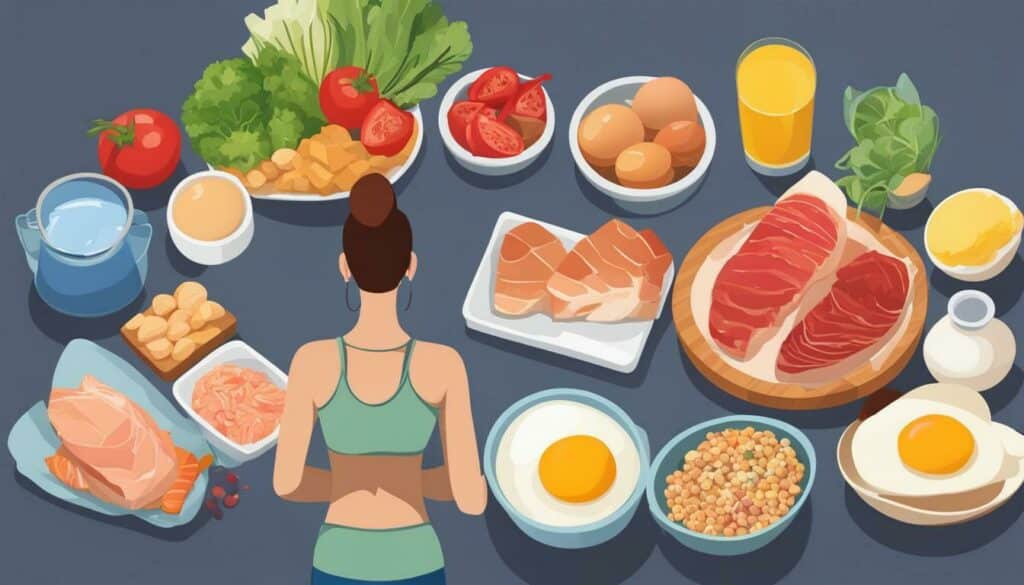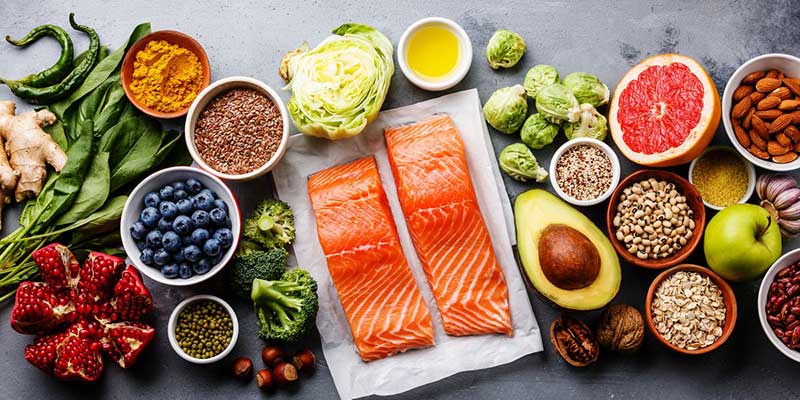
Here’s a possible introduction for section 1:
If you’re looking to shed unwanted pounds, you may have heard that protein can be a valuable tool in your weight loss arsenal. But does it really help with fat loss? In this comprehensive guide, we’ll explore the science behind protein and weight management so you can make an informed decision about whether protein is right for you.
Key Takeaways:
- Protein is an essential nutrient that plays a crucial role in many bodily processes, including weight management.
- Research suggests that increasing protein intake may help with fat loss by boosting metabolism and promoting feelings of fullness.
- However, protein should be part of a balanced diet and not relied on as a sole weight loss solution.
- Consult with a healthcare professional or nutritionist to determine the optimal protein intake for your specific needs.
Sure, here’s a draft for Section 2 of the article:
How Protein Aids in Weight Loss
Protein is an essential nutrient that has been shown to aid in weight loss. It plays a crucial role in burning fat, preserving muscle mass, and promoting feelings of fullness, making it a powerful tool in your weight loss journey. In this section, we will explore the ways protein benefits weight loss and how it can help you burn fat more effectively.
Protein for Fat Burning
One of the most significant advantages of protein is its ability to promote fat burning. Protein helps you burn more calories by boosting your metabolism, which can result in increased fat loss. Additionally, protein promotes the growth of lean muscle mass, which also aids in burning fat. By including protein in your diet, you can help your body burn fat more efficiently.
Protein Benefits for Weight Loss
Protein offers many other benefits beyond fat burning that can aid in weight loss. One significant advantage is that protein promotes feelings of fullness, which can help reduce calorie intake and prevent overeating. Additionally, consuming protein can help preserve muscle mass while losing weight, which is essential for maintaining a healthy body composition. By preserving muscle mass, you can ensure that weight loss comes from fat rather than muscle.
Another benefit of protein is that it can help regulate blood sugar levels, which can reduce cravings and prevent overeating. Protein also has a high thermic effect, which means that it requires more energy to digest than carbohydrates or fats. This makes it an excellent choice for weight loss, as it can help you burn more calories with each meal.
In summary, protein plays a significant role in weight loss by aiding in fat burning, preserving muscle mass, promoting feelings of fullness, and regulating blood sugar levels. By incorporating protein into your diet, you can harness its many benefits for weight loss and achieve your desired results.
Sure, here’s the draft for section 3:

Protein in the Fat Burning Process
Protein is known to boost metabolism, but how exactly does it aid in fat burning? It all comes down to fat metabolism. Proteins are broken down into amino acids that the body uses to synthesize muscle, but they also play a role in the breakdown of fats.
When you consume protein, it triggers the release of the hormone glucagon, which signals the body to begin the process of lipolysis (fat breakdown). This hormone also helps to activate lipase enzymes, which break down the fat cells so that they can be used for energy. In other words, protein aids in the mobilization of fats, making it possible for the body to burn them for fuel.
Additionally, protein has been shown to help stabilize blood sugar levels, preventing insulin spikes that can lead to the storage of excess fat. By keeping insulin levels stable, protein can help to ensure that the body is using stored fat as fuel instead of storing it as excess weight.
Overall, the benefits of protein in the fat burning process cannot be overstated. By boosting metabolism, activating fat-burning enzymes, and preventing insulin spikes, protein can help to maximize the effectiveness of your fat loss efforts.
Sure, here’s the HTML text for Section 4:
The Role of Protein in Fat Loss
Protein has a significant role in weight management and can be a valuable tool in achieving your fat loss goals. By providing a feeling of fullness, protein can help reduce appetite and calorie intake, facilitating weight loss. Moreover, protein consumption helps preserve lean muscle mass, which is critical in maintaining a healthy metabolism and sustaining weight loss.
Furthermore, protein has a high thermic effect, meaning that the body burns more calories to digest and absorb protein than it does for carbohydrates or fat. This effect can increase metabolism and promote the burning of calories, leading to a reduction in total body fat.
The role of protein in fat loss extends beyond its impact on metabolism. Research has shown that diets with a higher proportion of protein can lead to greater fat loss compared to diets with lower protein intake. Additionally, studies indicate that increasing protein intake while maintaining a caloric deficit can lead to a greater loss of body fat while preserving lean muscle mass.
Sure, here’s a draft for section 5:
Incorporating Protein for Fat Loss
To effectively harness the fat-burning potential of protein, it’s crucial to incorporate it into your diet in a way that suits your lifestyle and preferences. Here are some practical tips and strategies on how to use protein as a valuable aid in your fat loss journey:
- Start your day with a protein-rich breakfast. This will help regulate your appetite throughout the day and prevent overeating later on.
- Include protein in each meal and snack to promote satiety and prevent cravings.
- Choose lean sources of protein such as chicken, turkey, fish, tofu, and legumes to keep your fat intake low.
- Consider supplementing with protein powder to ensure you are meeting your daily protein needs. There are various options available such as whey, casein, and plant-based powders.
- Be mindful of hidden sources of protein in foods such as cheese, yogurt, and nut butter. While these can be a healthy addition to your diet, they also contribute to your overall protein intake.
By incorporating protein into your diet in a way that works for you, you can maximize its fat-burning potential and achieve your weight loss goals.
Sure, here’s the HTML text for section 6 of the article:
In Conclusion
After examining the evidence, it’s clear that protein can play a significant role in fat loss. By incorporating protein into your diet, you can help boost metabolism, aid in the breakdown of fats, and maintain lean muscle mass.
However, it’s important to remember that everyone’s nutritional needs are unique. Consulting with a healthcare professional or nutritionist can help you determine the optimal protein intake for your specific goals and needs.
Final Thoughts
Overall, by utilizing the power of protein in your weight loss journey, you can unlock the potential for sustainable and healthy fat loss. Remember to prioritize a balanced diet and regular exercise routine to achieve optimal results. So, เสริมโปรตีนเพื่อลดน้ำหนัก? Absolutely! With the right tools and knowledge, you can achieve your desired weight loss goals.
FAQ
Does protein help in fat loss?
Yes, protein can help in fat loss. By boosting metabolism, promoting feelings of fullness, and preserving lean muscle mass, protein plays a significant role in supporting weight loss goals.
How does protein aid in weight loss?
Protein aids in weight loss by increasing metabolism, reducing appetite, and helping to build and maintain lean muscle mass. These factors contribute to a higher calorie burn and improved fat burning capabilities.
What is the role of protein in the fat burning process?
Protein plays a vital role in the fat burning process by boosting metabolism, aiding in the breakdown of fats, and supporting the preservation of lean muscle mass. It enhances the body’s ability to effectively burn fat for fuel.
How does protein contribute to fat loss?
Protein contributes to fat loss in multiple ways. It increases satiety, helping to control appetite and reduce calorie intake. Additionally, protein helps preserve lean muscle mass, which is crucial for maintaining a high metabolic rate and burning more calories.
How can I incorporate protein for fat loss?
To incorporate protein for fat loss, ensure that it is a part of each of your meals and snacks. Prioritize lean protein sources such as poultry, fish, tofu, legumes, and low-fat dairy products. Aim to include a variety of protein-rich foods in your diet to provide the essential amino acids your body needs for optimal fat burning.
